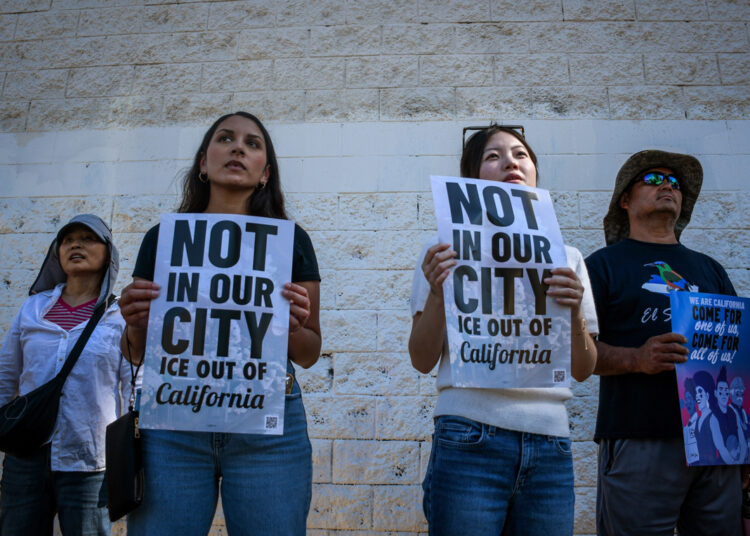At the initiative of the UN, June 20th is celebrated annually as World Refugee Day with the aim of “extolling the strength and courage of people who have been forced to leave their homes to escape conflict or persecution.”
That day, at St. Joseph’s Cathedral in San Diego, California, a mass was celebrated by Father Michael Pham, born in Vietnam and the first bishop appointed in the United States by Pope Leo XIV.
“Look with compassion on the refugees and exiles, on the segregated people and the lost children,” he was heard saying in the homily.
He continued: “Today I remain grateful to the United States, a nation of immigrants, for allowing me to start over. It is sad and disheartening for me to see this kind of thing happening in this country today,” he said, referring to the massive ICE raids and arrests of immigrants, both in San Diego, in the nearby Los Angeles, as well as throughout the country.
Accompaniment
After mass, a group of priests decided to accompany several undocumented immigrants to the Edward J. Schwartz Federal Building, the headquarters of both Immigration and Customs Enforcement and the San Diego Immigration Court, where the immigrants had been summoned.
It included Jesuit Father Scott Santarosa, a parish priest and one of its main organizers. Also present was the Bishop of San Diego, who came to the United States as a refugee in 1980 with his older sister and younger brother.
Likewise, San Diego Auxiliary Bishop Ramón Bejarano, born in Texas and who spent part of his childhood in Mexico, and Father Felipe Pulido, a Mexican who emigrated to the United States in his teens.
The goal, they said, was to be able to sit in the courtrooms of different immigrants, hear their cases and accompany them. “Our mission was simply to witness what was happening, to be present and, in some way, to communicate to them: ‘We are with you. We see you. We are not ignoring you. You are not ignored by God, and we walk with you,’” Father Santarosa said.
Of course, they didn’t intend to disrupt the court proceedings, but “a couple of interesting things happened,” Father Santarosa said. “Several people who go there told me that when we arrived, all the ICE agents left. They disappeared.”
“Someone also told me that the ICE agents presented the documentation of the people they were looking for, but they didn’t stay because of our presence.”
“I was also told that the way the judge handled the courtroom was different because of our presence.”
The religious leaders remained in the building for about two hours. They didn’t witness any arrests. And they saw several cases that received continuances. “We saw ICE agents in the hallways wearing masks,” Father Santarosa said. “Of course, it was an intimidating presence. In one of those cases, the attorney told me that our presence made a difference.”
“So the good news is that while we were there, no one was detained or deported. And it wasn’t because we were trying to disrupt the trial. We were simply present,” the father summarized.
But the event became an action of a certain ecumenism.
Imam Taha Hassane, director of the Islamic Center of San Diego, joined the Catholics as a show of unity. “As religious leaders, we preach from the pulpit; we preach and speak about justice, love, compassion and all of that. Now is the time to demonstrate these principles and values on the streets,” he emphasized.
“When we left the room, after 15 or 20 minutes, the ICE agents were no longer there. Our presence, you could say, intimidated them. That’s why they left,” said Felipe Pulido, auxiliary bishop of the Diocese of San Diego.
“We are asking for this situation to stop. Whether the U.S. government wants to listen to it or not is their problem,” added Ramón Bejarano, second auxiliary bishop of the Diocese of San Diego, who asserts that he has never hidden his disagreements with Donald Trump’s ideas and actions.
“The president is wrong: Jesus doesn’t ask us to rank our love for others,” he added. He finds it an extraordinary coincidence that the first U.S. pope arrived just at the time when the United States is cornering and attacking all immigrants, not just undocumented immigrants.
Making a difference
The presence of religious leaders in those places made “a huge difference in how immigrants are treated by authorities in the United States,” Pham said. “Thank God, they were accompanying immigrants in the courts and looking out for the undocumented.”
It was a way to show that “God is with us” and that “He never abandons us.” “We are all members of the body of Christ. We all belong. No documents are needed.”
The imam said, for his part, “I hope the Trump administration changes its policies and simply shows some compassion, some mercy in doing their job. Because the way they’ve been doing it has been very brutal; it wasn’t how we’re supposed to be as a nation.”
A recent CNN poll found that only 42% of respondents approved of President Trump’s performance, and 56% disapproved.
Sixty-three percent said Trump has failed to address the country’s most important issues, and 56% said he has overstepped the executive branch’s powers. Immigration management ranks as one of the latter cases.
The bishop of San Diego affirmed that the diocese will continue to support immigrants as needed. After the event, he suggested that Father Scott could spearhead a new effort to maintain the initiative.
Coda
In May 2025, Immigration and Customs Enforcement (ICE) began arresting immigrants in courthouses for expedited deportation. A tactic applied to people summoned for routine court proceedings.
On July 16, 2025, Democracy Forward, the National Immigrant Justice Center, the Refugee Center and Immigrants for Education and Legal Services, and the Lawyers’ Committee for Civil Rights of the San Francisco Bay Area filed a class action lawsuit against the policy on behalf of 12 immigrants.










